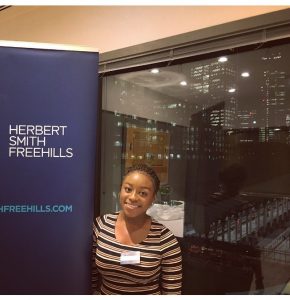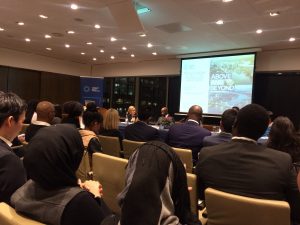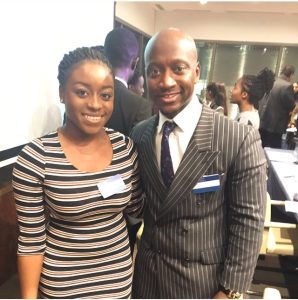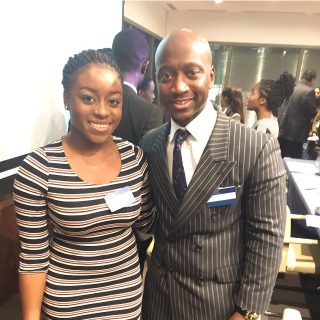 Lawbore’s Christianah Babajide reviews a Herbert Smith Freehills panel event.
Lawbore’s Christianah Babajide reviews a Herbert Smith Freehills panel event.
The “Black History Month” themed event focused on how Law students can embrace their differences and use them to their advantage in their legal career.
Chairing the event was Veronica Roberts, Partner at Herbert Smith Freehills and EU and UK competition law specialist, who posed questions to speakers on the panel.
Speakers
Tunde Okewale MBE
Profession: Criminal Barrister
Education: London Metropolitan University
Chambers: Doughty Chambers
Area of Expertise: Criminal Law
Tan Ikram
Profession: District Judge (MC), Law Society Social Mobility Ambassador
Education: University of Wolverhampton
Chambers: Magistrates’ Court
Area of Expertise: Crime and Extradition Law
Asad Dhunna
Profession: Associate Director
Education: University of Warwick
Chambers: Weber Shandwick
Area of Expertise: Public relations
Naomi Ofori
Profession: Associate
Education: University of Oxford
Firm: Herbert Smith Freehills
Area of Expertise: Real Estate and Corporate Real Estate
Does prejudice still exist in the legal sphere?
Many Commercial City Law Firms claim they offer a diverse working environment, embracing multiculturalism, prompting the assumption of a decrease in prejudice within the legal sector. The reality is that many Law Firms continue to approach these issues conservatively, preserving the existence of bigotry.
 When Tunde Okewale MBE, Criminal Barrister at Doughty Street Chambers, greeted the audience of aspiring Legal Professionals, he recounted an embarrassing personal anecdote of mistaken identity, when he himself, during the course of a trial, despite being the legal representative, was called to take the stand, of all places, as a defendant! To summarise Tunde’s advice, he urged Law students to react optimistically when confronted with discrimination on the basis of gender or ethnicity.
When Tunde Okewale MBE, Criminal Barrister at Doughty Street Chambers, greeted the audience of aspiring Legal Professionals, he recounted an embarrassing personal anecdote of mistaken identity, when he himself, during the course of a trial, despite being the legal representative, was called to take the stand, of all places, as a defendant! To summarise Tunde’s advice, he urged Law students to react optimistically when confronted with discrimination on the basis of gender or ethnicity.
Naomi Ofori, Trainee Solicitor at Herbert Smith Freehills added: “the only thing you can control is your reaction and attitude…” On a more positive note, she highlighted that being black could be used to great advantage. Naomi digressed, emphasising that whilst being a BME worker in a white-dominated society can make you feel invisible, with respect to the creation of an inclusive atmosphere, appearing different can increase your individuality, having the contrasting effect of hypervisibility; thus, the impression you make on colleagues is likely to be more memorable.
Echoing Tunde’s experience, District Judge, Tan Ikram, also admitted he was once misidentified as a defendant! “Perhaps it had never occurred to them that maybe I was the Judge,” he stated, seeing the lighter side when others may have been rightly offended.
The last speaker to introduce himself, Asad Dhunna, encouraged Law students to proactively respond to prejudice, as opposed to reacting with silence, imploring others to “call it out.” The Associate Director at Weber Shandwick, often found people inferring his sexual preferences without first consulting him. Regardless of potential awkwardness, Asad endorses whistleblowing in the workplace, because otherwise “they will carry on (with immoral practices).”
How does your background positively impact your career?
“Being a gay Muslim, you find that your background allows you to bond with other ethnic minorities (over the appreciation of our differences),” Asad articulated. Partial to relaxing in the office to the sound of Bollywood, he encouraged Law students to fully embrace their true identities, because, after all, “it is fun!”
When entering an elite profession dominated by white British males, black women are not only burdened by their race, but also by their gender – double jeopardy. However, Naomi shared her optimism, suggesting that the benefit of increased exposure, “as a black person,” outweighs, to an extent, the impact of sexism, receiving “many (job) offers” throughout her career.
Advice to Future Lawyers?
Providing nuggets of wisdom, the panel unanimously agreed that success would be bestowed upon those who work hard, maintain their strong academic records and never give up.
Tunde, as the first member of his family to attend University, confessed: “you are going to have hot water situations that will make you want to go soft, but don’t allow your environment to control you – stay strong.”
Asad, who has written for the Huffington Post, advised Law students to read extensively, which will help to develop opinions.
Conclusion

Speakers on the panel presented a general overview, analysing the effects of multiculturalism and diversity on the graduate market, while also explaining on a more personal level, their own professional experiences. Veronica concluded the evening by expressing her joy over Herbert Smith Freehills announcing a rise in Trainee Solicitor intake, which will, with any luck, proliferate the window of opportunity for multiculturalism to grow in the City and simultaneously convey an enhanced reflection of clients served.
Author Christianah Babajide is a guest contributor to Legal Cheek and you can see her work via her Legal Cheek profile page. She also writes regularly for Lawbore and CAREERS (City’s Careers blog). Thanks for this event review Christianah!

